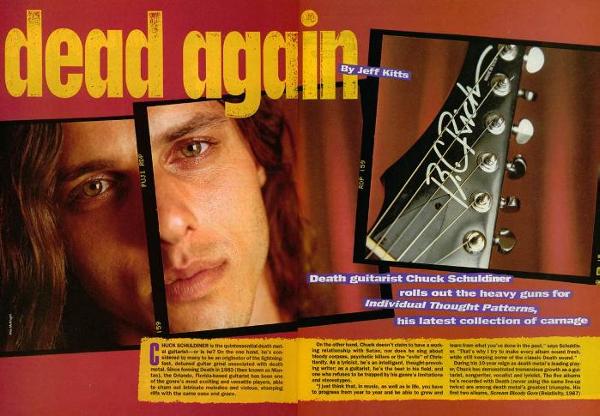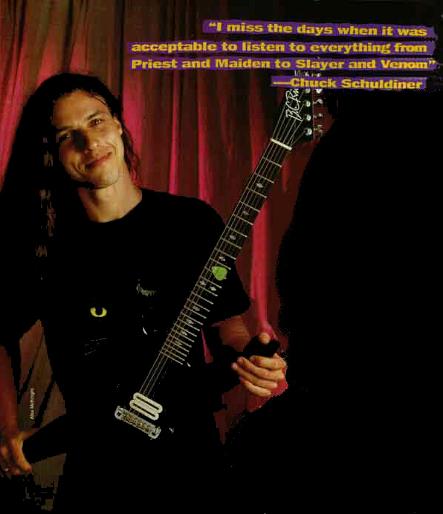| |

| |
 huck
Schuldiner is the quintessential death metal guitarist --
or is he? On the one hand, he's considered by many to be an
originator of the lightningfast, detuned guitar grind associated
with death metal. Since forming Death in 1983 (then known
as Mantas), the Orlando, Florida-based guitarist has been
one of the genre's most exciting and versatile players, able
to churn out intricate melodies and vicious, stomping riffs
with the same ease and grace. On the other hand, Chuck doesn't huck
Schuldiner is the quintessential death metal guitarist --
or is he? On the one hand, he's considered by many to be an
originator of the lightningfast, detuned guitar grind associated
with death metal. Since forming Death in 1983 (then known
as Mantas), the Orlando, Florida-based guitarist has been
one of the genre's most exciting and versatile players, able
to churn out intricate melodies and vicious, stomping riffs
with the same ease and grace. On the other hand, Chuck doesn't |
|
claim to have a working relationship with Satan, nor does
he sing about bloody corpses, psychotic killers or the "evils"
of Christianity. As a lyricist, he's an intelligent, thought
provoking writer; as a guitarist, he's the best in his field,
and one who refuses to be trapped by his genre's limitations
and stereotypes. "I just think that, in music, as well
as in life, you have to progress from year to year and be
able to grow and learn from what you've done in the past,"
says Schuldiner."That's why I try to make every album
sound |
|
fresh,
while still keeping some of the classic Death sound."During
his 10-year reign as death metal's leading player. chuck has
demonstrated tremendous growth as a guitarist, songwriter,
vocalist and lyricist. The five albums he's recorded with
Death (never using the same line-up twice) are among death
metal's greatest triumphs. His first two albums, Scream
Bloody Gore (Relativity,1987) and Leprosy
(Relativity, 1988), are examples
of classic death metal in its fastest, rawest and most powerfull
form, |
|
|
|
|
while his latest release,
Individual Thought Patterns (Relativity), is a sparkling
display of class musicianship, complex arrangements and progressive
melodies. "I
think too many bands today use other bands in their genre as guidelines,
and I don't want to do that," says Schuldiner. "I grew
up listening to much more than just death metal -- Kiss, Metallica,
Slayer, Iron Maiden, Queensrÿche, Mercyful Fate and Raven.
I don't ever want to abandon those influences -- they are what
sets Death abpart from everyone else." It's obvious that
Chuck Schuldiner isn't your typical death metal guitarist. No
hype, no controversery, no evil image... Chuck is a one-man death
metal machine, and that's just the way he likes it. "There
seems to be an unwritten law that says you have to have a traditional
band that lasts a long time, so maybe I'm a outcast because I
don't do that. To tell you the truth, doing everything myself
is the best way for me to work --and it's theonly way for Death
to sound like Death."
|
| |
|
GUITAR SCHOOL: Individual
Thought Patterns strikes a good balance between technical
musicianship and memorable songs.
CHUCK SCHULDINER: I definitely think that Human
was a little too one-dimensional, expecially in that it had a
lot of fast, aggressive material. It was great to get that out
on Human, but I think there's more variety and mood-swings
on Individual Thought Patterns. I try to make up for my
limited vocal style by creating different moods with music.
GS: Does
concentrating on intricate musicianship ever get in the way of
writing a good, simple riff?
SCHULDINER: Not really. You just have to know how to balance
everything out. It's good to let loose every now and then with
something that's really technical or trippy to throw the listener
off, but you have to know when to get back to straight-forward
and groove-oriented playing. You can't have too much of one thing
--spread everything out so each aspect is effective on its own.
GS: What
was your approach to the guitar on your early demos and first
few albums?
SCHULDINER: Lousy. [laughs] When I first started
the band, I'd only been playing guitar for six or seven months
--I couldn't even play a lead. My main goal was to bash out the
most brutal riffs ever with the most brutal guitar sound ever,
but I always had an urge to become a better guitarist. Even though
things were very crude back then. I still had a vision of becoming
a very musical death metal band. I knew it would take some time
to get to that piont, and I worked hard to get there.
GS: What
made you want to become a more versatile player?
SCHULDINER: I hate it when a band puts out the same record
twice. I wouldn't want to do that. I have to live with every record
I do for the rest of my life, so I don't want to repeat myself.
Plus, I don't want the people who buy my records to be disappointed.
I always try to improve as a player and let the music evolve naturally.
GS: Did
you have any formal training?
SCHULDINER: No. I'm self-taught. I took one guitar lesson
and learned "He's Got The Whole World In His Hands."
That was enough for me [laughs] I always tought it was
better to not go by what the instructional books and teachers
say. And, to tell you the truth, I was never too good at copying
other people's material, which is why we started writing our own
songs as soon as we formed Mantas. Since I didn't know anything
about playing correctly, I had to make up my own scales and fingerings.
By doing things on my own, I was able to develop more of an identity
as a guitarist than I could have gotten out of a book.
|
| |
 |
|
GS: But
you must have some knowledge of what you're playing.
SCHULDINER: Absolutely not. [laughs] I know enough
about what I'm playing to memorize the scales and things, but
I have no idea how you would label them. I do everything by ear.
I know that sounds unprofessional, but it's how I've always done
things. As long as I can play it, memorize it and apply it, I
don't need to know what you call it.
GS: Did
you become more gear-oriented as your playing improved?
SCHULDINER: I went through a little phase when I started
experimenting with some rack gear, but it didn't last long. Actually,
I originally wanted to record Individual Thought Patterns with
all rack equipment. I had an ADA MP-1, but when we tried to get
guitar tones, I couldn't find anything I liked. Our producer,
Scott Burns, recommended the new Marshall ValveState, so I tried
it and thought it sounded phenomenal --especially with a little
chorus. Now I use the Marshall all the time, a B.C. Rich Custom
guitar, and only a few extra effects.
GS: How
much of the old Death sound can be heard in your new material?
SCHULDINER: People have to understand that I think very
differently than I did when I was 16. In the 10 years since then,
I've grown and changed. But I still think it's important to hear
the ingredients that originally made the band special in our new
album, so you know it's Death.
GS: Are
there limits to how progressive Death's music can bcome without
losing its death metal edge?
SCHULDINER: I definitely have urges to get more experimental
with my music, and if I ever feel that it's just not suitable
for Death, I'll just use it for something else. I don't want Death's
music to become unmemorable, so I always go for a good balance
between the melodic stuff and the heavy stuff. In the future I
plan to do a more melodic, straight-forward heavy metal side project,
with a singer in the Rob Halford style.
|
| |
|
GS: How
did you hook up with [King Diamond guitarist] Andy LaRocque?
SCHULDINER: I've been a big fan of Kind Diamond and his
music for years, going back to the Mercyful Fate days. I've always
admired the musicians he had around him, and Andy has always been
a great guitarist. When I had to find another guitarist to play
on my new album, I decided to shoot for the top, and called Andy.
I asked him if he'd be into it, and he was. It was a real honor
to work with him, and I think his style of playing fits really
well with the rest of the band.
GS: Why
did you bring in a second guitarist?
SCHULDINER: I wanted everything about the album to be top-notch.
It's hard to find the right player who can fit into this style
of music and still have his own identity as a lead guitarist.
I grew up listening to a lot of bands that had a twin-axe attack,
and I think it's somewhat important to have if you really want
to be heavy. It adds variety to the music. And just knowing that
I was working with such a talented shredder like Andy really made
me work hard.
GS: What
kind of work did Andy do for the album?
SCHULDINER: Well, I had all the material written by the
time I contacted him, so I just needed him to do leads on four
songs, and have him double a few of my rhythm tracks.
GS: Does
it ever bother you that you haven't been able to keep a steady
line-up for more than one album?
SCHULDINER: Not at all. By changing musicians I've been
able to work with a lot of killer players, including Andy and
[former Dark Angel drummer] Gene Hoglan. People are so
obsessed with the idea that I'm a jerk to work with, when all
they should concern themselves with is whether or not the music
is good. All that matters to me is to have good musicians around
me and put out albums the fans enjoy. If someone else came in
and started writing material, it probably wouldn't sound like
Death; I think Death has its own style that people recognize.
I don't tell the other musicians what to play -- I just want them
to come into the studio and jam out and do what they feel is best.
GS: It's
interesting that you worked with Gene Hoglan, as there was a time
when you two supposedly did not get along.
SCHULDINER: Yeah, we had some problems years ago when he
was in Dark Angel, but we put those things aside. It was just
screwed-up, stupid shit that happened when Death and Dark Angel
toured together, and I'm glad we were able to get past it. I wanted
Gene to play on the record because he has a lot of experience,
and he has his own unique style of playing.
GS: You're
considered one of the best of the early death metal vocalists.
When did you first try singing in such a deep, raspy style?
SCHULDINER: When I first started Mantas, our drummer [Kam
Lee] sang, but he'd get tired after a while, so I picked up
the vocal duties. At first I tried to sing in a normal voice,
but that didn't work, so I went for the more brutal approach.
It really isn't an enjoyable way to sing, and at times I even
dread it. I mean, I'm 26 now, and I started singing this way when
I was 16. At that point I wasn't thinking that I'd have to sing
that way 10 years down the line. I've gotten used to it now, as
far as learning not to strain myself too much, but it still takes
a lot of energy and a lot of throat abuse to get through a show.
It really takes its toll.
GS: Does
singing this way ever hold your music back?
SCHULDINER: Definitely. I think my vocals are the biggest
limitation to our music. That's just reality. It's too shocking
and brutal for a mainstream audience to get into, and there's
no way to get around that. I know many people don't take this
style of singing seriously. I just try to do my best with what
I have. I get really self-conscious about my voice and work really
hard to get it right. I like to think my vocals have a little
more personality than the average death metal singer. Most singers
don't put a lot of effort into their vocals, or they use a lot
of effects to help them. Not me. There's no bullshit when it comes
to my vocals --what you hear is all me.
GS: Is
death metal music in any danger of burning itself out?
SCHULDINER: I'm very concerned about the whole metal scene
right now. I don't want to preach, but I would like to see metal
become more of a united thing. I'm tired of people breaking things
down into categories like thrash metal and death metal. I think
people tend to stick to one category, and I want people to support
all kinds of bands, whether it be Slayer or Queensrÿche
or Death. I miss the days when it was acceptable to listen to
everything from Priest and Maiden to Slayer and Venom.
GS: Is
Death still a death metal band?
SCHULDINER: You know, death metal today is totally different
from when I started playing. These days, when someone mentions
death metal, it's usually about some Satanic band that goes around,
hurts animals and plays music that doesn't have one speck of variety.
I've been told that Death is wimpy because we play high up on
the necks of our guitars! That's insane -- like writing with only
half of a typewriter! I just consider Death to be a metal band.
Whatever type of metal people want to classify us as, that's fine.
I just refuse to put a limit on what we do.
|
|
|
